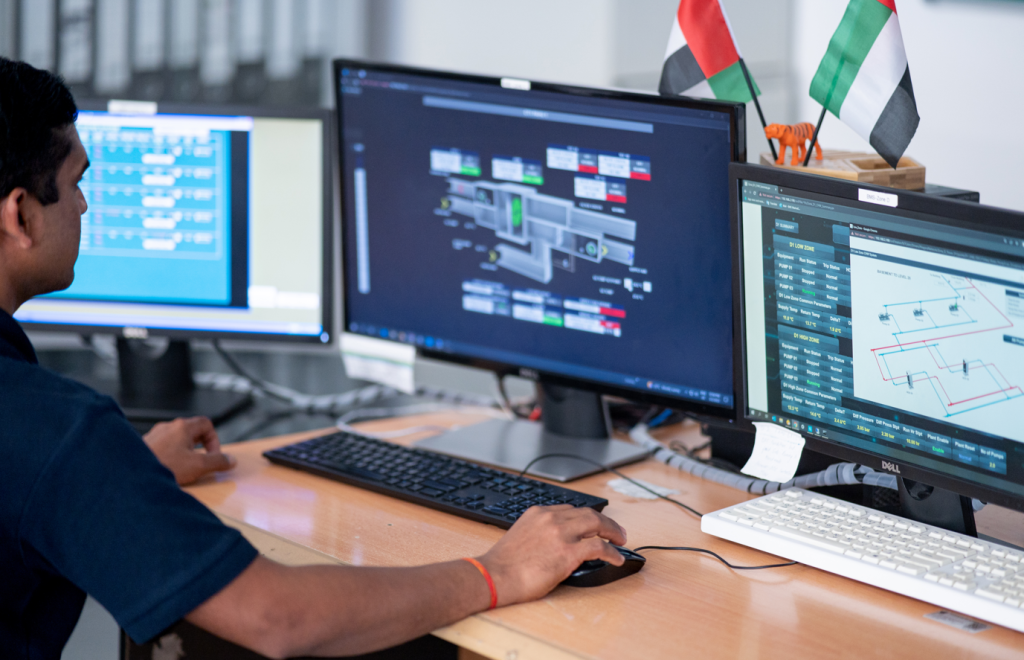By Geoff Warr, Director – Business Development, Inspire Integrated & Vinod Kumar – Technology Director, Inspire Integrated
Facilities Management is a complex industry that requires significant effort to manage day-to-day activities across multiple areas, including building maintenance, health and safety, energy management and visitor management. In recent years, there has been a shift towards integrating advanced technologies into FM operations, including Artificial Intelligence (AI), to increase operational efficiency and conserve energy. This trend has been further accelerated following the COVID-19 pandemic, which has created a greater need for automation and remote operations. Following the global shift, FM service providers began investing and researching innovative and practical applications of AI into routine operations to stay ahead of competition and meet the needs of the market.

At Inspire Integrated, we have developed a series of AI-powered solutions that cater to all areas of FM operations. We then combine them all through our PropEzy platform, which is a digitised software that connects all systems within the built environment and unifies them on one platform. In addition to merging a client’s operations on a unified dashboard and connecting separate systems and sub-systems with each other, the PropEzy platform provides valuable insights and analytics that help users make informed decisions about their FM operations and develop data-driven plans to further enhance overall efficiency.
The integration of AI with standard FM procedures is a steadfast method to amplify a company’s operations. FM managers must understand that this technology can be implemented depending on the project and the equipment available and is not a uniform solution that can be applied to all assets. Proper utilisation of AI can achieve reductions in transport time and resource & material usage, however, maintenance teams must first evaluate each asset individually and identify feasible methods of implementing AI and integrating it with different systems to enhance the asset’s performance.
One of the main areas where AI can be applied is in building management systems. Through machine learning, PropEzy integrates AI with Building Management System (BMS), giving AI control of systems across the building. AI-integrated buildings can collect information from different sources, analyse it, then make decisions based on the available information to apply changes across the building to increase the efficiency of different systems. For example, AI can control measurements of fresh air allocation in a building or make decisions to optimise frequency-driven chillers using the collected data. The information used for its decision-making process is based on various data points including the weather forecast, building occupancy, working schedule, etc. The more we increase our application of this method across our buildings, the more efficient and eco-friendlier our whole operations become.

Another useful application of AI in facilities management is implementing AI technologies within the planned maintenance aspect. Traditionally, FM teams are required to follow a strict preventative maintenance plan regardless of the asset usage. The plan in most cases follows a monthly schedule which dictates a routine maintenance 12 times a year, meaning technicians must visit the site and inspect the equipment’s condition as per the schedule to make sure there are no irregularities with the equipment. With the involvement of AI and IoT sensors, FM managers now have the ability to devise a predictive maintenance plan that considers asset usage and relies on automated alerts to know when service is required. By placing smart sensors on the equipment, we enable the asset to indicate information on a day-to-day basis, allowing teams to constantly monitor the condition of equipment and be aware if any unwarranted issues arise. This predictive approach to the maintenance plan gives FM managers the capacity to reduce the frequency of maintenance visits, playing a substantial role in reducing energy and resource usage. Additionally, it provides them with useful data and analytics that will help them understand patterns and prepare more efficient plans in the future.
AI Technologies can also significantly enhance an asset’s visitor management system. Visitor management systems integrated with AI have intelligent features that enable smooth visitor access from the parking area to the apartment or office. The system employs various smart technologies, such as Automatic Number Plate Recognition (ANPR) at the parking entrance, facial recognition and smart access control via an authorised user’s mobile phone. With such cutting-edge features, a visitor management system enables live monitoring of visitors, ensures access for authorised persons only, facilitates drop-off and pick-up arrangements, maintains a daily visitors’ log and provides additional benefits for effective management of visitors.
Implementing AI solutions in day-to-day operations is an inevitable course of action for all FM service providers that are planning further growth and development of their business. Awareness surrounding the value of this technology is growing, as more key players in the industry develop and apply AI solutions to their operations. The immense benefits of AI integration are not seen in terms of efficiency alone, but also in terms of resource conservation and reduction of carbon footprint, which play a significant role in achieving companies’ ambitious ESG goals.
The rise of AI-powered technologies opens many doors for FM managers to incorporate these constantly developing solutions to improve their operational efficiency and support their efforts towards achieving Net Zero goals. We at Inspire Integrated heavily capitalise on the unique capabilities provided by the PropEzy platform. The PropEzy PowerBI dashboard generates crucial data sourced from multiple destinations including an integrated mobile application that technicians use to record their activity/job progress. This data is then controlled, monitored and analysed by our FM teams through the interactive dashboard, producing valuable information that is then used to guide managers in the planning and decision-making process. That information includes accurate figures of hours saved, printing cost saved, calling cost saved, number of trees saved as a result of paper-less activity and much more.Top of Form
In addition to the previously mentioned solutions, we also invest a great deal in developing and implementing IoT-powered smart washroom technologies which are conveniently integrated with PropEzy. Within any facility, washrooms are typically high-maintenance areas that need to be serviced regularly by cleaning staff to check on soap dispensers, paper towels, bins, etc. By placing sensors in the washrooms, cleaners will be prompted on the status of supply through their PropEzy dashboard, enabling individuals to take necessary action as and when required as opposed to constant visits to the washrooms. This results in significant improvements in operational efficiency for a task that is traditionally time-consuming and inefficient, especially in bigger facilities. PropEzy uses the data gathered from the sensors to identify peak usage times and predict a suitable cleaning schedule.
The integration of AI and smart technologies into facilities management has become increasingly important in today’s rapidly evolving landscape. By leveraging AI-powered solutions, facilities managers can enhance operational efficiency, conserve energy, improve security measures and provide a better experience for building occupants. As companies continue to prioritise sustainability and ESG goals, integrating AI into facilities management will become a critical component of achieving these objectives.

